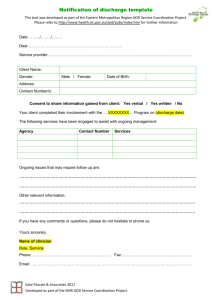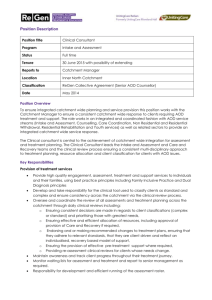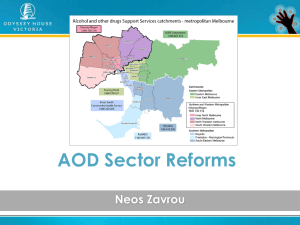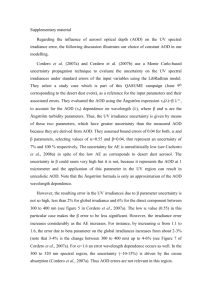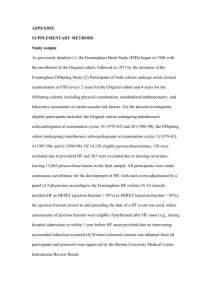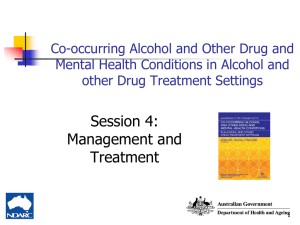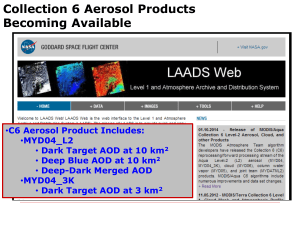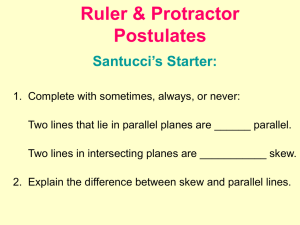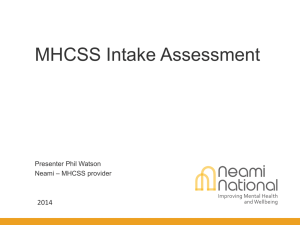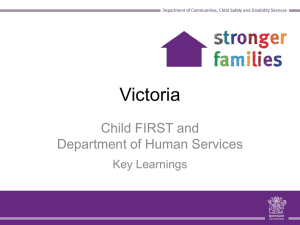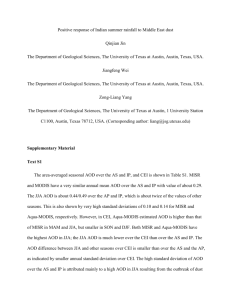here - North & West Homelessness Network
advertisement
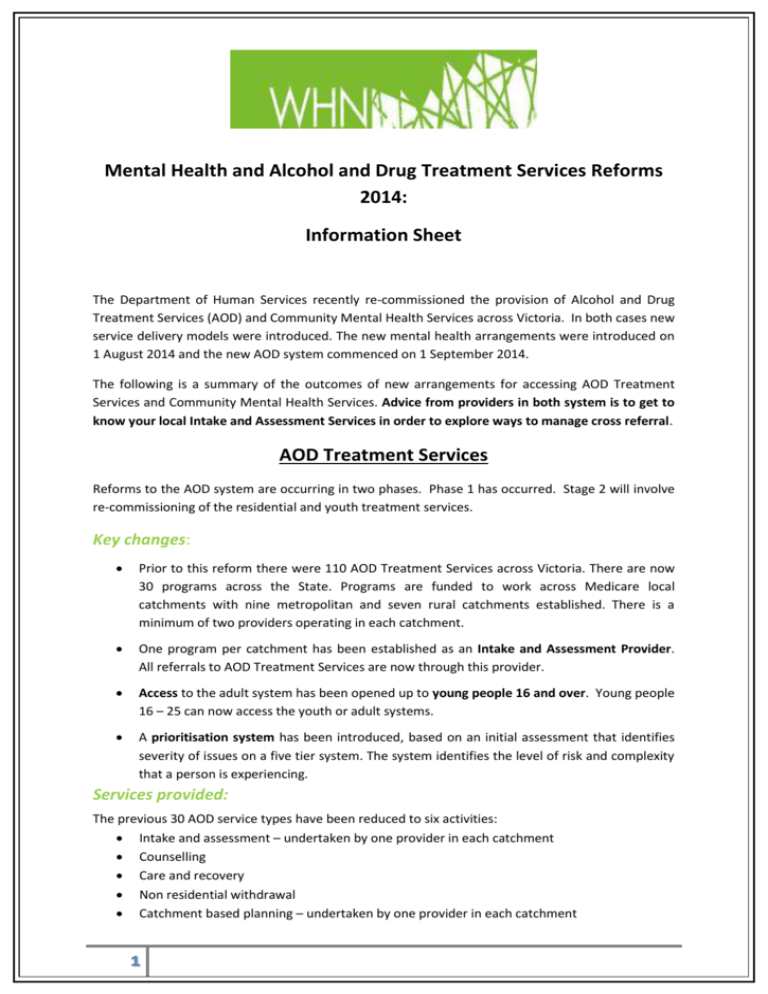
Mental Health and Alcohol and Drug Treatment Services Reforms 2014: Information Sheet The Department of Human Services recently re-commissioned the provision of Alcohol and Drug Treatment Services (AOD) and Community Mental Health Services across Victoria. In both cases new service delivery models were introduced. The new mental health arrangements were introduced on 1 August 2014 and the new AOD system commenced on 1 September 2014. The following is a summary of the outcomes of new arrangements for accessing AOD Treatment Services and Community Mental Health Services. Advice from providers in both system is to get to know your local Intake and Assessment Services in order to explore ways to manage cross referral. AOD Treatment Services Reforms to the AOD system are occurring in two phases. Phase 1 has occurred. Stage 2 will involve re-commissioning of the residential and youth treatment services. Key changes: Prior to this reform there were 110 AOD Treatment Services across Victoria. There are now 30 programs across the State. Programs are funded to work across Medicare local catchments with nine metropolitan and seven rural catchments established. There is a minimum of two providers operating in each catchment. One program per catchment has been established as an Intake and Assessment Provider. All referrals to AOD Treatment Services are now through this provider. Access to the adult system has been opened up to young people 16 and over. Young people 16 – 25 can now access the youth or adult systems. A prioritisation system has been introduced, based on an initial assessment that identifies severity of issues on a five tier system. The system identifies the level of risk and complexity that a person is experiencing. Services provided: The previous 30 AOD service types have been reduced to six activities: Intake and assessment – undertaken by one provider in each catchment Counselling Care and recovery Non residential withdrawal Catchment based planning – undertaken by one provider in each catchment 1 Access to the AOD Treatment System The provider In Melbourne’s north and west is a partnership between Odyssey House Victoria and UnitingCare ReGen. The service can be contacted on: 1800 700 514. Intake and assessment will comprise: 1. Triage; 2. Assessment; 3. Clinical Review. http://www.odyssey.org.au/images/files/recom/Assessment%20&%20Intake%20Update%20v6.0.pd f) provides an example of a client’s clinical pathway through the Intake and Assessment structure and into agreed AOD treatment. The first step for clients will be to contact the Triage workers via the 1800 number above. The Triage worker will ascertain what the caller is looking for and either provide information and/or referral or facilitate an AOD screening, which will determine the callers eligibility for AOD treatment and assign clients to one of the five classification tiers. All contacts with the Triage worker will receive a response within 24 hours. Face-to face and online screening is also available. In time, clients will also be able to book appointments online via the ReGen and Odyssey websites. A comprehensive AOD assessment (or, if appropriate, a brief counselling intervention) will be arranged for eligible clients at a location and time that is most convenient for them. Clients not assessed as eligible for AOD services will be provided with information and advice, psychoeducation, telephone counselling and brief intervention. Service providers See: http://www.odyssey.org.au/images/files/recom/Assessment%20&%20Intake%20Update%20v6.0.pdf for the list of catchment services and their locations. Tools utilised by the AOD services are available online. In some cases homelessness support services will be able to undertake initial assessment for their clients and forward the completed tools to the Intake and Assessment service. 2 Mental Health Community Support Services A new Mental Health Act was introduced in Victoria in 2014. The Act establishes a Mental Health Tribunal and Mental Health Complaints Commissioner. Re-commissioning of the (Psychiatric Disability Rehabilitation Support Services (PDRSS) has led to the establishment of Community Mental Health Support Services providing: individual outreach support, youth/adult residential rehabilitation and supported accommodation services. Key changes: Services are now funded to offer Individual Client Support Packages and to facilitate groups in community settings. The new system Is based on a central intake assessment service, prioritising referral to services to those most in need. Prioritisation is based on a standard eligibility tool. Eligibility to the system is for those who: o are 16 – 64 years old can access the service. o have a disability attributable to a mental health issue (as assessed by a mental health professional o have impairments that are likely to be permanent and that impact capacity for social and economic participation. The system does not have capacity to respond to people with anxiety or depression. A regional panel determines access to bed based services. Neami utilises a Collaborative Recovery Model (CRM) developed in partnership with the University of Wollongong Services already have waiting lists for their Intake Assessment Services and for access to treatment services. Services provided: Three services have now been funded to provide Initial Assessment Services around the State: Neami National, ACSO and EACH. See http://docs.health.vic.gov.au/docs/doc/23D9C9664B486ACCCA257CF3000903F0/$FILE/Fact%20She et%20Intake%20Assessment%20Function.pdf for a fact sheet about services provided and a chart of the pathways through the mental health system; and http://www.neaminational.org.au/sites/default/files/vicintake_faq_complete.pdf for contact details and a map of catchments covered by each provider. 3 Neami National provides: Intake and assessment – undertaken by one provider in each catchment Home and community outreach support: one on one support to identify strengths and goals Group programs Prevention and recovery support (PARC): short stays in a supported environment (Preston). Youth residential rehabilitation support: youth residential rehabilitation (no service in the west) Partners in Recovery (PIR) helps people access and coordinate the services they need for their recovery (in the inner north). Catchment based planning Access to the Community Mental Health System Neami National is the community mental health provider In Melbourne’s north and west. The Intake Assessment service can be contacted on: 1300 379 462 The new Mental Health Community Support Service (MHCSS) Intake Assessment Service will provide information and referral for people seeking mental health support. The service will: • Screen and determine eligibility to receive support • Prioritise referrals • Refer eligible people to support services for a comprehensive assessment • Provide screening information to support services with the person’s consent - to avoid people having to repeat their information • Follow up referrals to make sure people are getting access to the services they need • Provide self-management information and follow-up contact with people on the needs register • Provide general mental health information and facilitate referrals to other services as needed • Convene the Regional Bed-Based Selection Panel for Youth/Adult Residential Rehabilitation and Supported Accommodation Services • Transfer of information to support providers Service providers See http://www.neaminational.org.au/sites/default/files/regional_fact_sheet_-_north-west.pdf for the list of mental health providers in Brimbank, Maribyrnong and Melton; and http://www.neaminational.org.au/sites/default/files/regional_fact_sheet_-_inner-north.pdf for providers in Moonee Valley and Melbourne. Brochures and fact sheets See: http://www.neaminational.org.au/about-us/mental-health-resources for a range of brochures about the services provided by Neami National. 4
